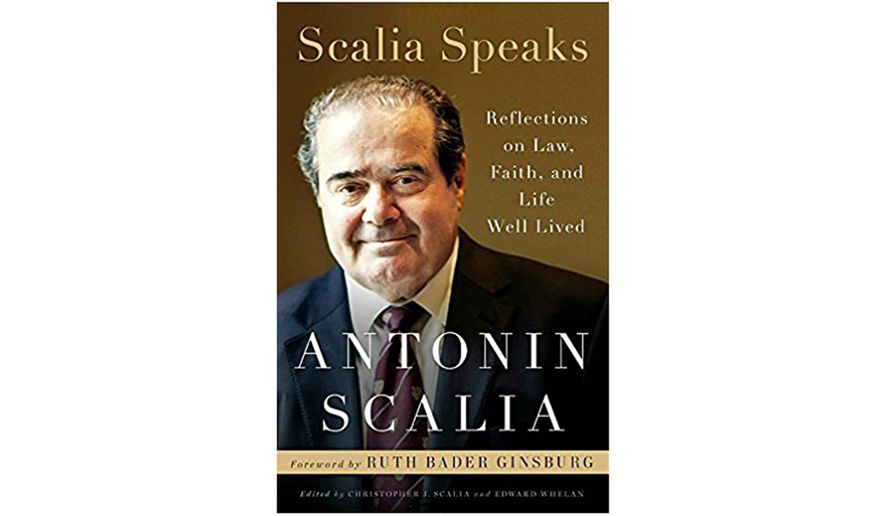OPINION:
SCALIA SPEAKS: REFLECTIONS ON LAW, FAITH, AND LIFE WELL LIVED
By Antonin Scalia
Edited by Christopher J. Scalia and Edward Whelan
Foreword by Ruth Bader Ginsburg
Crown Forum, $30, 432 pages
Viewed by both admirers and detractors as the most transformative jurist of our era, the late Supreme Court Justice Antonin Scalia had a towering intellect. Yet he was humble. He was wise. And he was very funny. And he never forgot the lesson his Italian immigrant father impressed upon him: “Brains can be hired by the hour, just like muscles. Only character is not for sale at any price.”
That helps explain why the favorite Founding Father of this learned man wasn’t one of the most brilliant and best educated Founders but instead a man with no formal education — the Founder renowned for his impeccable character: George Washington. The reverence with which Justice Scalia speaks about the father of our country should make any patriot cringe that Americans now observe “Presidents’ Day” and no longer celebrate “George Washington’s Birthday.”
Typical of Justice Scalia’s wit was his address to the Society of the Friendly Sons of St. Patrick. After taking care to make his audience aware that he had “married a McCarthy and have four-and-a-half Irish children,” he said:
“The Irish have all sorts of ways of seeming to be knowledgeable when they are not. One, of course, is lying. Any other group would take offense at that — but I am sure that this gathering will proudly agree that nobody in the world can tell a glorious, towering false tale as well as an Irishman. An Italian lie is often more subtle and deceptive, more likely to be believed. But if it is not believed, it is seen as a sneaky, unworthy, disreputable thing.
“The wonderful thing about a proper Irish lie is that it does not matter if it is believed. It is such a bold, courageous, imaginative invention that, even when you see through it, you are so impressed with the quality of mind that could concoct such nonsense that it is impossible to have anything but admiration for the author.”
This compilation of 45 speeches of Justice Antonin Scalia is a splendid treasure trove collection in which he speaks to us about a broad range of important matters organized under themes of “The American People and Ethnicity”; “Living and Learning”; “Faith”; “Law”; “Virtue and the Public Good”; and “Heroes and Friends.”
Nearly every speech of his contains delightful laughs and every one of them conveys wisdom. Some, such as the address he delivered at a Days of Remembrance commemoration for victims of the Holocaust, are powerfully moving.
Denouncing anti-Semitism — “It is particularly absurd for a Christian to hate the people of Israel. That is to hate one’s spiritual parents, and to sever one’s roots.” — this devout Roman Catholic said of the Holocaust that “you will have missed the most frightening aspect of it all if you do not appreciate that it happened in one of the most educated, most progressive, most cultured countries in the world” of that period.
Which suggests such an evil could happen again anywhere, and the only way to prevent that, he said, is “by acknowledging, and passing on to our children, the existence of absolute, uncompromisable standards of human conduct. Mankind has traditionally derived such standards from religion; and the West has derived them from and through the Jews. Those absolute and uncompromisable standards of human conduct will not endure without an effort to make them endure.”
As his colleague and dear friend Justice Ruth Bader Ginsburg notes in her gracious foreword, “Justice Scalia was known for opinions of uncommon clarity and inimitable style, writings that did not disguise his view of the opposing side. Yet, as he put it, he attacked ideas, not people.”
He relentlessly attacked and counterattacked bad ideas. He was the greatest intellectual warrior of our time in the fight to defend the Constitution of the United States against any bad idea that threatened to undermine it.
Judges zealous to substitute what they wish the Constitution or the law says for what it actually says, and activists desiring that some court grant their wishes when the Constitution or the law do not, embrace the notion of a “living Constitution” that changes to accommodate “evolving standards” and/or “the progress of a maturing society.”
Wrong, says Justice Scalia, “the provisions of the Constitution have a fixed meaning, which does not change.” The only alternative to the “original meaning” standard to which he adhered, he points out, is “standardless judicial constitution-making,” which is “inherently unstable.”
One could fill a book about why Justice Scalia was right in his counterattacks on the bad idea of the “living Constitution” — and every other bad idea undermining the Constitution and rule of law that he devastates in the speeches included in “Scalia Speaks.” And so right in his take on pretty much everything else. But better that you read this wonderful book.
Fred J. Eckert, a former Republican congressman from New York, served as U.S. ambassador to Fiji and to the U.N. Agencies for Food and Agriculture under President Ronald Reagan.




Please read our comment policy before commenting.